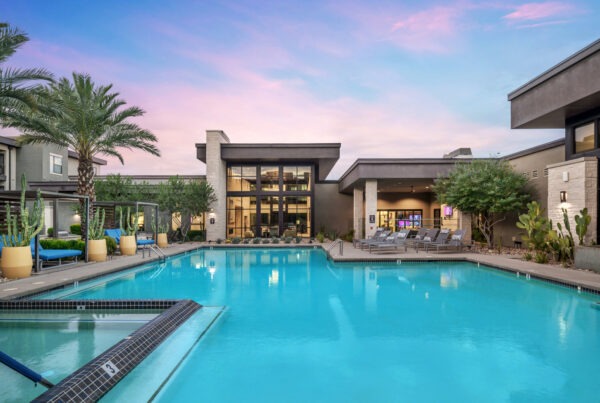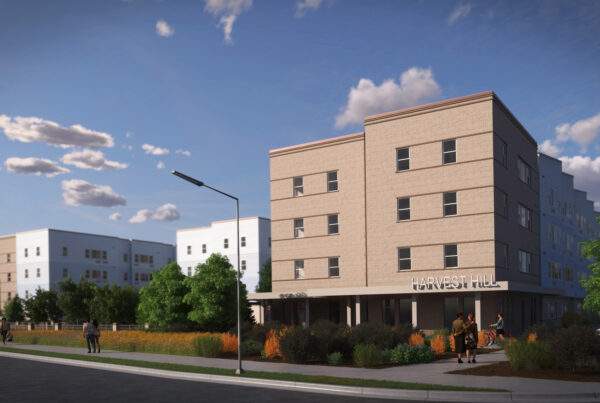Designing for Work-from-Home Living
Adding workspaces in apartment communities isn’t a new concept—but the way they’re designed and integrated is evolving. Today’s residents expect more than just a desk in the corner; they want flexible, well-designed environments that support productivity, collaboration, and lifestyle as remote and hybrid work are no longer temporary shifts—they’re here to stay. In 2025, about 22% of U.S. employees are working remotely, with more than half of them in hybrid roles. Even as some companies push for return-to-office mandates, the demand for flexibility hasn’t faded. Eighty-three percent of workers say they prefer a hybrid setup for its balance of productivity, flexibility, and lifestyle.
This reality has created new expectations for housing. People want homes and communities that support the way they truly live and work. That means developers can’t treat “work-from-home” as an afterthought—it has to be integrated from the start. Thoughtful design not only elevates everyday living, it sets communities apart in a competitive market.
Maximizing Flexibility Through Smart Design
Today’s renters want purposeful workspaces that make working from home comfortable, professional, and productive. We’ve developed unit design strategies that integrate thoughtful work spaces without compromising everyday comfort, such as:
- Pocket offices designed into underutilized corners
- Built-in desks thoughtfully placed away from bedrooms and kitchens
- Flexible room configurations that can shift into dedicated work zones
When designed well, these features can enhance livability while boosting marketability and long-term value.
Built-in desk at Senna at Canyon Trails and flexible room configuration at Alexan Uptown that can work well as an office or dining space.
Communal Work Environments
Traditional apartment business centers and work environments are being reprogrammed to better accommodate various work styles and needs focused on flexibility and choice with:
- Semi-private workstations for focused productivity.
- Phone booths for private calls or virtual meetings.
- Small conference rooms with AV equipment for meetings.
- Flexible furniture layouts with lounge-style seating and small tables for casual work.
- Rentable private offices that eliminate the need for outside co-working memberships.
- Covered outdoor patios and terraces with power access.
- Coffee bars and refreshments stations.
Beyond resident satisfaction, thoughtful workspace designs can create tangible economic benefits. Thoughtfully designed spaces can reduce tenant turnover through increased satisfaction and convenience while private workspace rentals can provide ongoing income beyond base rent.
Flexible, communal work environments that effectively accommodate lifestyle needs add value for residents and keep communities relevant long-term.
Doing it Right
In a market where remote work flexibility influences housing decisions, properties with purpose-built work-from-home features command premium positioning and pricing.
We’ve helped our partners bring these ideas to life:
The Henry
Partner: Carmel Partners
Designed for young professionals, The Henry features a comprehensive communal work center that eliminates the need for external co-working memberships. The space has a variety of different workspaces and zones including an outdoor terrace and a coffee bar, offering both value and convenience for residents.
The community’s design philosophy centers on authentic community-building, with amenities that genuinely enhance residents’ professional and personal lives.
Rye SoBo
Partner: Price Development Group
This development creates a signature two-story shared workspace that activates the building’s prominent corner location. The design serves dual purposes: providing essential work-from-home amenities while contributing to the neighborhood’s street-level vitality.
MAA Milepost 35
Partner: MAA
Featuring a business lounge with private offices distributed throughout each building, this community represents the perfect integration of professional workspace needs with residential comfort. The design ensures residents never feel far from a productive work environment.
Each project demonstrates how intentional design transforms communities into places that truly support the way people live and work.
The Takeaway
The shift to remote and hybrid work isn’t going away—it’s evolving. Developers who design with this in mind will not only meet market demand but also create lasting value for both residents and investors.
The question isn’t whether to include work-from-home considerations. It’s how to do it thoughtfully—with the expertise and attention to detail that creates exceptional living experiences.
At KEPHART, we don’t just add a desk and call it a home office. We design spaces that work beautifully for how people live now—and for how they’ll live in the future.






